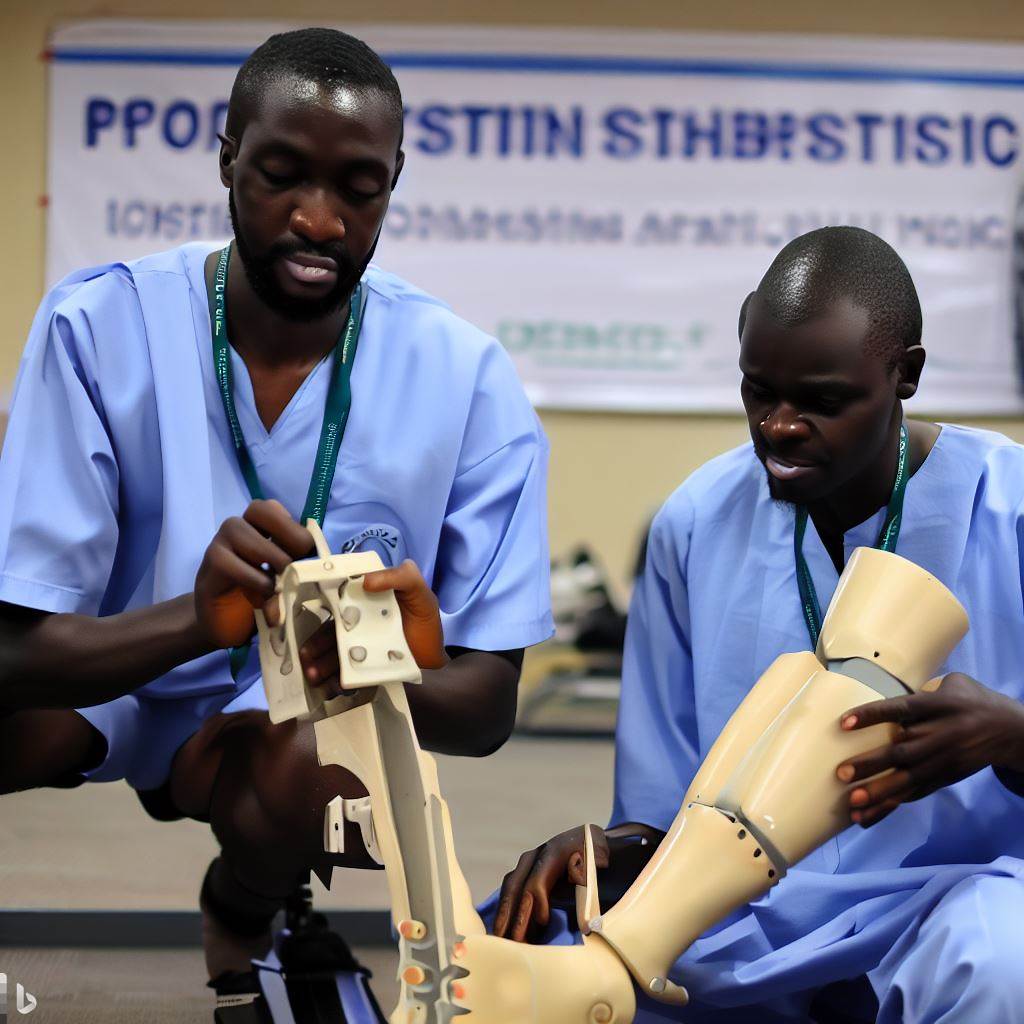Introduction
Nursing assistants in Nigeria are vital for healthcare. They provide quality care to patients, aiding recovery. Nursing Assistant Key Skills are essential.
In this blog section, we will discuss the key skills that every Nigerian nursing assistant must possess.
Importance of Nursing Assistants in Healthcare in Nigeria
Nigerian healthcare system heavily relies on nursing assistants to deliver essential care to patients.
These professionals assist registered nurses and physicians in various healthcare settings such as hospitals, clinics, and long-term care facilities.
They are responsible for providing direct patient care, administering medications, monitoring vital signs, and assisting with daily activities.
The importance of nursing assistants cannot be overstated, especially in Nigeria, where there is a shortage of healthcare professionals.
With limited resources and an increasing population, nursing assistants are the backbone of the healthcare system.
They provide support to overworked nurses and doctors, ensuring that patients receive proper attention and care.
Furthermore, nursing assistants bring a sense of compassion and empathy to their work.
They provide emotional support to patients, helping them cope with their illnesses and promoting a positive healing environment.
Their empathetic approach and ability to connect with patients create a trusting relationship, enhancing the overall patient experience.
In the end, nursing assistants are integral to the healthcare system in Nigeria.
Their skill set, including direct patient care, medication administration, and emotional support, makes them indispensable in providing quality healthcare services.
As the demand for healthcare professionals continues to grow, nurturing and developing the skills of nursing assistants becomes vital for the well-being of patients in Nigeria.
Communication Skills
A nursing assistant plays a crucial role in providing care and support to patients in healthcare settings. In order to excel in this role, they must possess a range of key skills, one of which is effective communication.
Importance of Effective Communication in Nursing Care
Clear and effective communication is essential in nursing care as it helps establish trust and understanding between the nursing assistant and the patient.
By communicating effectively, nursing assistants can gather important information about a patient’s condition, symptoms, and concerns.
Effective communication enables nursing assistants to establish a rapport with patients, making them feel more comfortable and confident in their care.
Good communication skills also extend to interacting with other healthcare professionals, ensuring smooth coordination and collaboration in patient care.
Ability to Listen and Respond to Patients’ Needs
Listening actively to patients allows nursing assistants to gain a better understanding of their unique needs and preferences.
By responding to patients’ needs promptly and appropriately, nursing assistants can provide personalized care that meets their specific requirements.
Effective listening skills also help nursing assistants identify any changes in a patient’s condition or any concerns they may have.
By addressing patients’ needs and concerns proactively, nursing assistants contribute to their overall well-being and satisfaction with the care they receive.
Clear Communication Ensures Safety and Enhances Patient Care
Clear communication is vital for ensuring the safety of patients. By conveying information accurately, nursing assistants prevent errors and misunderstandings.
When nursing assistants communicate clearly with patients, they can provide instructions about medications, treatments, and post-care protocols effectively.
By using simple and understandable language, nursing assistants ensure that patients fully comprehend their care plans and can actively participate in their own recovery.
In emergency situations, clear communication is crucial for quick decision-making and swift action, minimizing risks and ensuring patient safety.
Effective communication not only enhances patient care but also contributes to overall healthcare outcomes and the reputation of the healthcare facility.
In fact, the ability to communicate effectively is an essential skill that every Nigerian nursing assistant must possess.
It enables them to establish trusting relationships with patients, listen and respond to their needs, and contribute to their safety and well-being.
Clear communication enhances both patient care and the overall healthcare experience, making it a critical skill for nursing assistants in Nigeria.
Read: Job Market Outlook for Nursing Assistants in Nigeria
Empathy and Compassion
Defining Empathy and Compassion in Healthcare Settings
Empathy involves putting yourself in the patient’s shoes, understanding their experiences and emotions, and providing support accordingly.
Compassion, on the other hand, goes beyond understanding and prompts action to alleviate suffering.
Significance of Showing Empathy towards Patients
Empathy establishes trust and strengthens the nurse-patient relationship. It helps identify individual needs, reduce patient anxiety, and enhance overall satisfaction with healthcare services.
Empathy also improves communication, as it allows nurses to connect with patients on an emotional level. This connection helps gather accurate information and provides a holistic approach to patient care.
Moreover, showing empathy fosters a supportive environment, where patients feel valued and understood.
This sense of emotional support can positively impact the patient’s mental and emotional well-being during their healthcare journey.
How Compassion Impacts Patient Outcomes
Compassion significantly influences patient outcomes, including physical and psychological recovery. When patients feel cared for, it can alleviate anxiety, stress, and fear associated with healthcare experiences.
Compassion creates a sense of hope, comfort, and reassurance, which plays a vital role in patient healing and improvement.
It can reduce the perception of pain, enhance patient compliance with treatments, and contribute to a more positive healthcare experience.
Additionally, compassionate care may lead to increased patient satisfaction, adherence to medical advice, and better overall healthcare outcomes.
It enables the development of a healing environment and promotes an individualized approach to patient-centered care.
Incorporating Empathy and Compassion as a Nigerian Nursing Assistant
To be an effective nursing assistant, it is crucial to develop and demonstrate empathy and compassion in your daily practice.
- Show active listening skills, validate patient concerns, and provide emotional support.
- Offer comforting gestures, such as holding a patient’s hand or offering a kind smile.
- Practice patience and understanding, even in challenging situations.
- Manage your emotions to provide a calm and supportive presence for patients.
- Be culturally sensitive and respect diversity to provide equitable care to all patients.
Remember, empathy and compassion are learned skills that can be nurtured and improved over time.
Therefore, it is essential to engage in continuous self-reflection and professional development to enhance these skills. Empathy and compassion are vital skills for nursing assistants in healthcare settings.
By showing empathy, understanding patient feelings, and incorporating compassion, nursing assistants can positively impact patient outcomes and contribute to a more holistic and patient-centered care experience.
Read: The Impact of Nursing Assistants on Nigerian Healthcare
Attention to Detail
Attention to detail is a crucial skill that every Nigerian nursing assistant must possess. It plays a significant role in providing quality patient care and ensuring their safety and comfort.
The significance of being detail-oriented in nursing assistance
Being detail-oriented allows nursing assistants to pay attention to patients’ vital signs and symptoms, which is essential for their overall well-being.
This skill enables nursing assistants to notice even the smallest changes in a patient’s condition, helping them quickly identify any potential issues and take appropriate actions.
By paying meticulous attention to detail, nursing assistants can improve patient outcomes and contribute to their overall recovery.
The role of paying attention to patients’ vital signs and symptoms
Paying attention to patients’ vital signs and symptoms is one of the primary responsibilities of a nursing assistant.
They need to closely monitor and document vital signs such as heart rate, blood pressure, and respiratory rate.
By doing so, nursing assistants can identify any alarming changes that may indicate a medical emergency or deterioration in a patient’s health condition.
Moreover, being detail-oriented enables nursing assistants to carefully observe and report any unusual symptoms or discomfort experienced by the patients.
These symptoms can range from pain, nausea, shortness of breath, to any abnormal behavior or changes in mental status.
By promptly notifying the healthcare team about these observations, nursing assistants contribute to early detection and prompt intervention, preventing potential complications.
How being detail-oriented improves patient safety and comfort
In addition to monitoring vital signs, being detail-oriented also ensures patient safety and comfort.
Nursing assistants who pay attention to detail are more likely to implement proper infection control measures, such as hand hygiene, sterilization, and use of personal protective equipment.
These precautions significantly reduce the risk of healthcare-associated infections and promote a safe environment for both patients and healthcare providers.
Moreover, being detail-oriented supports effective documentation and record-keeping.
Nursing assistants are responsible for accurately documenting the care provided, medications administered, and any other relevant observations.
Attention to detail helps them avoid errors and inconsistencies in documentation, ensuring that the patient’s healthcare information is accurate and accessible for future reference.
Furthermore, being detail-oriented promotes effective communication among the healthcare team.
Nursing assistants who pay attention to detail can provide accurate and concise reports to the nurses, physicians, and other healthcare professionals.
This enables the team to make informed decisions about the patient’s care plan and ensures continuity of care.
In essence, attention to detail is a vital skill that every Nigerian nursing assistant must possess.
It enhances patient safety, improves overall patient outcomes, and contributes to the efficiency and effectiveness of the healthcare team.
By emphasizing the significance of being detail-oriented, nursing assistants can provide high-quality care and make a positive impact on the lives of their patients.
Read: The Impact of COVID-19 on Optometry Practice in Nigeria
Organizational Abilities
Organizational abilities are crucial for Nigerian nursing assistants as they play a vital role in healthcare settings.
The ability to manage workloads and prioritize tasks is of utmost importance for effective care delivery.
Importance of Managing Workloads and Prioritizing Tasks
With multiple patients and tasks, nursing assistants must efficiently manage their workloads. Prioritizing tasks ensures that urgent and critical care needs are addressed promptly and effectively.
Failure to manage workloads and prioritize tasks can result in compromised patient care and safety. It helps nursing assistants to stay organized, reduce stress levels, and maintain a productive work environment.
Effective workload management enables nursing assistants to provide quality care to all patients equally.
Role of Organization in Maintaining Efficient Care Delivery
Efficiency in care delivery is directly linked to the organization and management skills of nursing assistants.
Being organized allows nursing assistants to track patient information, medications, and treatment plans effectively.
Organization ensures timely and accurate documentation, contributing to continuity of care.
Efficient organization helps nursing assistants in facilitating smooth communication and collaboration with healthcare teams.
It assists in maintaining a clean and organized workspace, minimizing the risk of infections and accidents.
How Organization Aids Nursing Assistants in Effective Healthcare Settings
Being organized enables nursing assistants to locate essential equipment, supplies, and medications quickly. It helps in managing time efficiently, ensuring timely completion of tasks and avoiding delays.
Organized nursing assistants can provide comprehensive and accurate patient reports to healthcare professionals.
Efficient organization contributes to a positive patient experience by reducing confusion and improving communication.
It allows nursing assistants to anticipate and prepare for potential emergencies or changes in patient conditions.
Basically, organizational abilities are indispensable for Nigerian nursing assistants. Managing workloads and prioritizing tasks are essential for efficient care delivery and patient safety.
Being organized enhances the effectiveness of nursing assistants in healthcare settings by improving communication, facilitating timely and accurate documentation, and ensuring a smooth workflow.
Therefore, acquiring and honing organizational skills should be a priority for every nursing assistant in Nigeria.
Read: Step-by-step Guide to Becoming a Nursing Assistant in Nigeria

Adaptability and Flexibility
Being a nursing assistant in Nigeria requires a wide range of skills and abilities to provide effective patient care.
While technical knowledge and expertise are important, there are certain key skills that every Nigerian nursing assistant should possess.
In this section, we will explore the importance of adaptability and flexibility in the nursing profession.
Adaptability
Adaptability is the ability to adjust and respond to changing circumstances in the healthcare environment.
Nursing assistants need to be able to adapt to new situations and challenges that may arise during their work.
Need for Adaptability
Nursing assistants often work in a fast-paced and unpredictable environment where circumstances can change rapidly.
They need to be able to adapt to new situations, such as unexpected patient emergencies or changes in treatment plans.
Adapting to changing circumstances is crucial for nursing assistants as it allows them to provide the best possible care for their patients.
It helps them stay calm and focused when faced with unexpected challenges, ensuring that patients receive the attention they need in a timely manner.
Importance of Flexibility in Emergency Situations
Being flexible in emergency situations is one of the most important skills for nursing assistants.
Emergencies can occur at any time, and nursing assistants need to be prepared to respond quickly and efficiently.
In emergency situations, nursing assistants may be required to prioritize their tasks and adjust their schedules to meet the needs of the patients.
Flexibility allows them to think on their feet and make decisions that are in the best interest of the patients.
Improving Patient Care and Teamwork
Adaptability plays a vital role in improving patient care and teamwork. When nursing assistants can adapt to changing circumstances, they can provide more personalized care to each patient and meet their individual needs.
Furthermore, adaptability fosters teamwork among healthcare professionals.
Nursing assistants who are flexible and adaptable can collaborate effectively with other members of the healthcare team, enhancing communication and coordination in patient care.
In a nutshell, adaptability and flexibility are essential skills for Nigerian nursing assistants. They enable nursing assistants to respond effectively to changing circumstances, particularly in emergency situations.
These skills not only improve patient care but also promote team collaboration, ultimately enhancing the overall healthcare experience for both patients and healthcare professionals.
Read: The Path to Becoming a Surgeon in Nigeria
Physical Stamina
In order to be a successful nursing assistant in Nigeria, it is crucial to possess certain key skills. One of these skills is physical stamina, which is essential for handling the physical demands of the job.
Being a nursing assistant requires a great deal of physical activity. From lifting and transferring patients to assisting with bathing and dressing, these tasks can be physically demanding.
It is important for nursing assistants to have the stamina to perform these tasks effectively and efficiently.
Physical stamina is not just important for the tasks themselves, but it also plays a crucial role in providing consistent, high-quality care.
Nursing assistants who have the physical stamina to handle the demands of the job are able to provide care without becoming fatigued or worn out.
Consistency in care is vital for nursing assistants, as they often work with the same patients on a regular basis.
Having the physical stamina to consistently provide quality care ensures that patients receive the best possible treatment and support.
Furthermore, physical stamina is important for nursing assistants to avoid injuries and accidents.
Lifting and moving patients can be risky if not done properly, and having the necessary stamina can help in preventing accidents and injuries to both the nursing assistant and the patients.
Additionally, physical stamina contributes to the overall well-being and job satisfaction of nursing assistants.
By being physically fit and capable of handling the demands of the job, nursing assistants are able to perform their duties without feeling overly exhausted or burnt out.
To maintain and improve physical stamina, nursing assistants should engage in regular exercise and physical activity.
Activities such as walking, jogging, or strength training can help in building endurance and strength, which are essential for the physical demands of the job.
All in all, physical stamina is a key skill that every Nigerian nursing assistant must possess.
It is crucial for handling the physical demands of the job, providing consistent, high-quality care, avoiding injuries and accidents, and ensuring overall well-being and job satisfaction.
By prioritizing physical fitness and stamina, nursing assistants can excel in their roles and make a positive impact on the lives of their patients.
Read: Top Institutions to Study Phlebotomy in Nigeria
Teamwork and Collaboration
Effective teamwork plays a crucial role in healthcare settings as it directly impacts patient outcomes and overall healthcare delivery.
Nursing assistants are an integral part of the healthcare team and their collaboration with other healthcare professionals is essential for providing quality care.
The Significance of Effective Teamwork in Healthcare Settings
In healthcare settings, effective teamwork ensures that different professionals work together harmoniously to achieve common goals.
This collaboration enhances communication, efficiency, and coordination, resulting in improved patient care.
By working as a team, healthcare professionals can pool their knowledge and skills to identify and address complex patient needs.
This interdisciplinary approach facilitates better decision-making, reduces errors, and maximizes patient safety.
Nursing Assistants’ Collaboration with Other Healthcare Professionals
Nursing assistants collaborate with various healthcare professionals, including doctors, nurses, therapists, and social workers, among others.
They contribute their expertise and provide valuable support to enhance patient care outcomes.
Working closely with nurses, nursing assistants assist in performing routine tasks such as taking vital signs, administering medication, and assisting with mobility.
They also communicate important patient information to the healthcare team, ensuring continuity of care.
Nursing assistants collaborate with therapists in implementing treatment plans, monitoring patient progress, and providing emotional support during therapy sessions.
They work together to facilitate rehabilitation and improve the overall well-being of patients.
In collaboration with social workers, nursing assistants help address patients’ social and emotional needs, including connecting them with appropriate community resources and support systems.
This holistic approach fosters improved patient outcomes and promotes overall healthcare well-roundedness.
The Role of Teamwork in Improving Patient Outcomes and Overall Healthcare Delivery
Teamwork is vital in improving patient outcomes and overall healthcare delivery.
Effective collaboration among healthcare professionals results in a more comprehensive assessment of patients’ conditions, increased accuracy in diagnosis, and timely intervention.
By pooling their collective expertise, the healthcare team can develop tailored treatment plans for patients.
Each member brings their unique perspective, which helps in identifying potential risks, planning interventions, and preventing complications.
Teamwork also promotes an atmosphere of trust and support, encouraging the sharing of knowledge and professional growth.
This fosters a positive work environment that ultimately translates into improved patient care and satisfaction.
Furthermore, effective teamwork enhances communication among healthcare professionals, leading to better coordination of patient care across different departments and specialties.
This reduces the likelihood of miscommunication, errors, and delays in healthcare delivery.
Ultimately, the collaboration and teamwork among healthcare professionals, including nursing assistants, are fundamental for ensuring the provision of high-quality, holistic, and patient-centered care in Nigerian healthcare settings.
Conclusion
In summary, this blog post highlighted the key skills that every Nigerian nursing assistant must possess. These skills include effective communication, empathy, attention to detail, flexibility, and teamwork.
It is imperative for Nigerian nursing assistants to possess these skills as they are crucial for providing quality care and support to patients.
Furthermore, continuous improvement and development of these skills are crucial for nursing assistants to enhance their professional abilities and ensure the best possible outcomes for patients.
Therefore, Nigerian nursing assistants are encouraged to invest time and effort in refining these skills to excel in their roles and contribute to the healthcare system in Nigeria.




